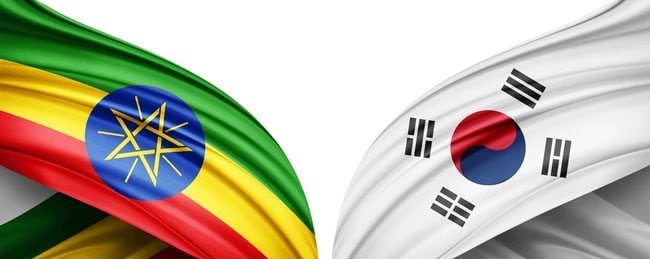Ethiopia is key for Korea’s broader African vision
Addis Ababa, March 10, 2025 (FMC) – Ethiopia holds strategic importance for Republic of Korea’s broader African vision, particularly in trade and investment, said Ethiopian Ambassador to ROK Dessie Dalkie in a written interview with The Korea Herald.
Citing Ethiopia’s geopolitical location, infrastructure, population, economic potential and stability as major factors, Dessie positioned his country as a key economic and diplomatic partner for Republic of Korea’s engagement with Africa.
“Ethiopia is situated in the Horn of Africa, serving as a gateway between Africa and the Middle East,” he said, underlining the country’s proximity to shipping routes such as the Red Sea and the Suez Canal.
The Horn of Africa refers to the easternmost region of Africa, encompassing Djibouti, Eritrea, Ethiopia and Somalia — countries whose cultures share deep links.
Ethiopia’s proximity to shipping routes such as the Red Sea and the Suez Canal makes the African country a key commercial and logistical hub, according to the Ambassador.
“Korean companies see Ethiopia’s potential in textiles, manufacturing and construction, but investment remains below expectations,” Dessie noted, citing a lack of awareness and certain perceived risks. He suggested that “enhancing information transmission through trade shows and investment guides” could bridge this gap.
The Republic of Korea actively supports Ethiopia’s development in education, health, energy and technology transfers. “The Republic of Korea’s expertise in ICT, agriculture and renewable energy presents great collaboration opportunities,” he added. To attract investors, Ethiopia is offering “duty-free imports, tax rebates and investment guarantees.”
Highlighting Ethiopia’s nearly 10 percent annual GDP growth, Ambassador Dessie stressed its “strategic location as Africa’s gateway and access to a 1.3 billion-person market through AfCFTA.”
AfCFTA is the largest free trade area globally, encompassing 54 of the 55 African Union members and a combined GDP of $3.4 trillion.
He also pointed to green energy initiatives like the Grand Ethiopian Renaissance Dam (GERD), Africa’s largest hydroelectric project.
“Investing in Ethiopia means contributing to sustainable development in one of Africa’s most promising economies,” Dessie said. “Together, we can build a future that benefits us all.”
Asked why Ethiopia holds strategic importance for Republic of Korea’s broader Africa vision in trade and investment, the ambassador underscored that Ethiopia has 126 million people as of 2023, making it Africa’s second most populous country.
Reports suggest that demographic changes in Africa will have a significant impact on the global order.
United Nations projections estimate that Africa’s population will reach nearly 2.5 billion by 2050, meaning that over 25 percent of the world’s population will be African.
“This vast and growing consumer base presents significant opportunities for Korean companies looking to enter the African market,” he said, citing Ethiopia as one of Africa’s fastest-growing economies due to homegrown economic reforms.
According to Dessie, Ethiopia’s potential and its establishment of industrial parks and special economic zones to attract foreign investment align with Republic of Korea’s strengths in construction, technology and manufacturing.
“Korean companies, particularly in textiles and manufacturing, have already invested in these zones, benefiting from tax reductions and access to a young, low-cost labor pool,” he said.
The Ethiopian government has made significant investments in infrastructure, including roads, railways and energy projects.
“Korean enterprises, known for their infrastructure development capabilities, are well-positioned to participate in these projects directly or through public-private partnerships,” said Dessie.
As for how Korean businesses can expand in Ethiopia, Ambassador Dessie suggested promoting Korean business associations, investment incentives, encouraging public-private partnerships, and activating bilateral agreements.
Diplomatic stability
Ambassador Dessie also underlined that due to global supply chain disruptions, the Republic of Korea is seeking to diversify its raw material and manufacturing bases, and that Ethiopia’s stability and strong diplomatic ties with the Republic of Korea could support trade and investment.
The two countries’ historical bond dates back to the engagement of over 6,000 Ethiopian troops in the Korean War.
“Ethiopia’s substantial natural resources and developing industrial base make it an appealing option for Korean enterprises looking to reduce dependency on traditional markets,” Dessie said, noting Republic of Korea’s collaboration with Ethiopia through aid and technical assistance.
“This engagement strengthens bilateral relations and creates opportunities for Korean businesses to enter the Ethiopian market,” he added.
It was mentioned that Ethiopia is Republic of Korea’s top development partner in Africa.
Direct flights between Incheon and Addis Ababa have boosted connectivity as the Republic of Korea seeks to expand ties beyond development cooperation in areas such as trade, investment and culture.
“When we evaluate economic cooperation and potential follow-up actions, South Korea and Ethiopia’s trade has been growing but remains relatively modest,” he said when asked about his assessment of Republic of Korea-Africa ties since a summit held last year.
The Republic of Korea primarily exports machinery, electronics and vehicles to Ethiopia, while it imports agricultural products such as coffee, cut flowers and sesame seeds, he said, adding that there is significant potential to expand and diversify trade between the two nations.

